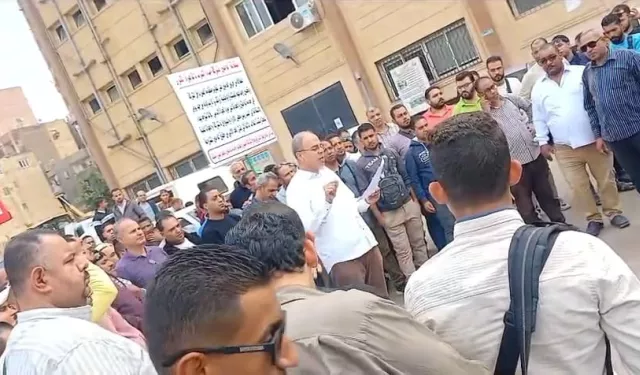Workers at Cairo’s public water and sanitation utility have temporarily suspended a 12-day protest campaign, demanding a formal timeline for the implementation of long-standing labor demands, according to multiple employees who spoke to Al Manassa.
The suspension, which came after coordinated demonstrations at several company sites on Monday morning, aims to give the company’s chairman, Mostafa El-Shimi, a final chance to respond with concrete commitments. Workers insisted the move is not a retreat, but a pause, citing the ongoing parliamentary elections as an additional reason for the temporary halt.
The protests began on Nov. 12 across multiple Cairo branches, calling for the integration of overdue bonuses dating back to 2016, fair application of Egypt’s minimum wage policy, tax reimbursement adjustments, and the removal of senior executives—particularly deputy chairman for financial and administrative affairs, Ali Amasha.
By the next day, demonstrations had spread to 30 sites, including water networks, desalination plants, customer service offices, storage facilities, and the company’s Ramses Street headquarters. The movement gained traction in other governorates, with parallel protests erupting in Alexandria, Giza, and Sharqiya.
However, daily operations have continued at all branches.
The decision to suspend action does not mean abandoning their demands, one worker told Al Manassa. “This is a window for the administration,” he said, noting management claimed it needed time to study the financial implications. Continued disruption, they argued, would hinder that process.
A second worker said management deliberately sowed division among protestors by persuading bill collectors—whose strike had slashed revenues by 80%—to return to work, offering them incentives of 1,000 to 2,500 Egyptian pounds.
While some viewed this as a factor behind the broader pause, he stressed that non-collectors, especially from the networks and stations, remain committed to the demands, including permanent contracts and backdated bonuses.
A coalition of human rights organizations, political parties, and labor committees issued a joint statement Sunday backing the workers. They emphasized that the workers’ demands—minimum wage enforcement, bonus payments, and the regularization of contract labor—are already codified in Egyptian law.
The statement expressed deep concern over rising living costs and stagnant wages, warning that some workers had even secured court orders mandating bonus payouts, which the company has so far refused to implement. The signatories urged the Ministries of Housing and Labor to intervene and ensure the company complies with legal obligations.
On Saturday, protestors escalated their demands, calling for Egypt’s Administrative Control Authority to investigate alleged embezzlement by senior company officials. Workers in Minya joined the call for overdue bonuses and the regularization of temporary contracts.
Videos viewed by Al Manassa show demonstrators chanting “Hey administrative watchdog—our company’s full of thieves!” and “Raise your voice, don’t be afraid—corrupt leaders must go!”
One worker confirmed that several employees had filed formal complaints to the Administrative Control Authority, citing “systematic corruption, embezzlement of public funds, and theft of workers’ money.”
Workers complain of stagnant wages, exacerbated by the failure to integrate bonuses or apply wage scale progression. According to testimonies, salaries of workers with 20 or 30 years of service are nearly equal to those of new hires. Many also cited wide disparities between their pay and that of employees at the Holding Company for Drinking Water, who reportedly earn 3,000 to 4,000 pounds more.
This protest is the latest in a wave of labor unrest in Egypt’s public sector across several industries.
In September, both farmers and workers in the sugar industry held a coordinated three-week long protest in response to overdue wages in both Aswan and Qena Egyptian Sugar and Integrated Industries Company plants. In October, textile workers of both UNIRAB Polvara Spinning & Weaving and Misr El-Amreya Spinning & Weaving Co. in Alexandria staged protests against wage cuts and a unilateral suspension of health insurance. The following month, 1,200 UNIRAB Polvara workers staged a walkout. In Port Said and Suez, workers at the Canal Company for Mooring & Lights launched a strike in late October to protest no-warning bonus cuts.
